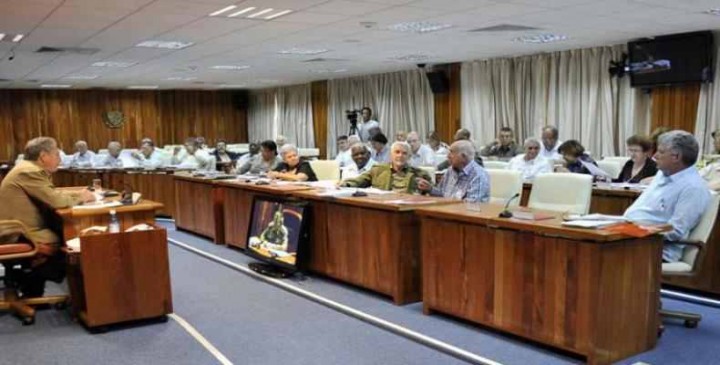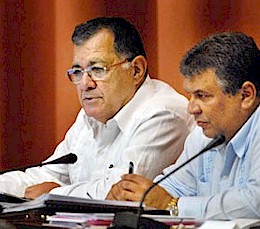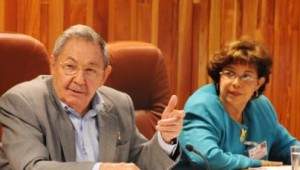
Ministers give Castro a mixed report on the economy
The Cuban economy is growing but not fast enough. And President Raúl Castro wants to know why.
That, in a nutshell, is the substance of the meeting Saturday (June 21) of the Council of Ministers, where Cuba’s top functionaries reported to the nation’s president.
“We’re facing a gigantic task,” Castro told the ministers, according to the daily Granma, “but we cannot allow ourselves to be overwhelmed by the problems or be cowed by them. We must be optimistic, because that has always been the spirit of the Revolution.”
ECONOMY IS UP BUT GROWTH IS SLOW

The first speaker was Adel Yzquierdo Rodríguez, minister of the Economy and Planning, who explained that “the Cuban economy is growing with relation to 2013 but it’s not reaching the levels set by the [2013 Development] Plan,” thus “inducing a slowdown greater than expected.”
This is due to “not getting the foreign revenue we had planned on,” and to “adverse climate conditions, and internal insufficiencies.” All that happened, Yzquierdo said, “in the framework of a complex international situation and an upsurge in the economic, commercial and financial blockade imposed by the government of the United States.”
A growth of 0.6 percent of the Gross Domestic Product (GDP) is expected for the first semester of this year and 1.4 percent for the whole year, Yzquierdo said. He identified the activities enjoying the greatest growth as transportation, storage, communications, agriculture and cattle raising, forestry, sugar production, hotel and restaurant services.
The indicators for the production, consumption, generation, importation and exportation of energy sources are “generally favorable,” the minister added.
Investments are proceeding well and will meet 95 percent of the target by year’s end. Still, problems remain, “related to the securing of supplies in a timely manner, a deficit in the labor force, low productivity, and insufficiencies in contract compliance and the execution of foreign financing.”
The greatest decrease in production came in the manufacturing industry.

IMPORTS WILL CONSUME MOST OF STATE BUDGET
Lina Pedraza Rodríguez, minister of Finance and Prices, reported that the State Budget for the first half of this year shows a surplus of 1.3 percent, thanks to “the taxes on gains and personal income, Social Security contributions and State investments.”
However, much of the Budget will not be spent in improvements because of poor productivity, which is reflected in shortages of native products and the consequent need to import foreign goods. Much of Cuba’s budget is spent in imported food and products.
The fiscal deficit for 2013 totaled 1.17 billion pesos, Pedraza said, the result of low revenues, low exports and insufficient investments. The peso is rated at a par with the U.S. dollar.
Reporting on the implementation of the economic guidelines set in 2013, the vice president of the Council of Ministers, Marino Murillo Jorge, said that “we see a sustained increase, although qualitatively at this time we’re tackling the most complex and decisive tasks for the updating of the economic model.”
Monetary unification, the replacement of the convertible peso by the national peso, “will not, by itself, solve all the problems of the economy,” Murillo said. Nevertheless, the changeover “is an indispensable part of a process that includes the implementation of other policies designed to increase efficiency and productivity in the workplace, as well as the improvement of the different mechanisms that distribute the wealth created.”
The government continues to issue credits, he said. “Until last April, 272,332 credits were issued, for a total of 2.48 billion pesos.”
The number of non-agricultural cooperatives continues to grow and the experiment should be evaluated and controlled, Murillo said. In a one-month period, 249 of the authorized 498 cooperatives were created.
Another experiment, the wholesale of farm equipment, tools and supplies in the provinces of Havana, Artemisa and Mayabeque, is proceeding well, but “production is still insufficient and prices remain high.”
WILL THE STATE QUIT THE RESTAURANT BUSINESS?
As to self-employed entrepreneurs, more than 467,000 individuals had obtained permits by May of this year, he said. Restaurants run by individual businessmen “have produced favorable results; the workers increased their income; the locales have been reanimated; the hours of service have been expanded,” while at the same time “the prices to the public have risen in line with the increased quality and variety of the [food] offerings.”
As a result, the Council of Ministers has decided that “the establishments that furnish food services, personal and technical services, will be, as a rule, managed in non-state forms.” It was not clear whether the government would divest itself entirely from the restaurant and personal-services businesses.
The change from state-run to individually-run enterprise “will be made in an orderly and gradual fashion, taking into account the number of workers, the levels of activity and the structure of the services,” Murillo said.
“The prices in these places will be established according to supply and demand, with the exception of those [prices] that are centrally set [by the State],” Granma pointed out.
To read the entire account of the Council of Ministers session, in Spanish, click here.

